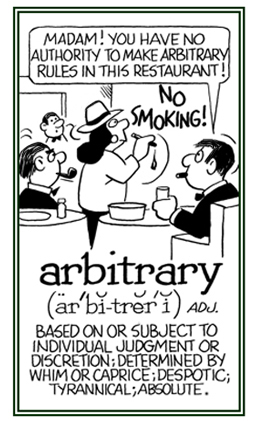-ary
(Latin: a suffix; a person who, a place where, a thing which, or pertaining to; connected with; having the character of; apparatus)
The following examples of this suffix represent a very small number of those that exist in other parts of this lexicon.
2. A reference to a religious purification of the body by washing, especially a ritual washing of the hands, etc.: Robert completed his ablutionary ceremonies of soaping up, rinsing, and the drying of his hands each morning before going to prayer in the chapel.
2. A reference to where indigenous or original fauna or flora existed or may continue to survive in a geographical area: The animals in these aboriginary regions no longer exist.
The local zoo had an aboriginary section in which the native plants of the region were growing.
2. Etymology: from Anglo-French adverser, from Old French adversier, from Latin adversarius, "opponent, rival"; literally, "turned toward one", from adversus, "turned against".


Go to this Word A Day Revisited Index
so you can see more of Mickey Bach's cartoons.
2. Providing food or nourishment: The picnic that Jane prepared was filled with lots of alimentary and nutritional products, like tomatoes, grapes, oranges, and whole grain sandwiches, and, in addition, some non-alimentary goodies, like chips, chocolate, and coke!
The Alimentary Canal
The digestion and absorption of food take place in a muscular tube that runs for over thirty feet (about nine meters) from the mouth to the anus. This is the digestive tract, sometimes referred to as the alimentary canal because we take our aliment (food) through it. It takes about fifteen hours for food to complete the trip through the alimentary canal.
2. A celebration or other commemorative ritual marking the date of an important event.
3. Etymology: from Latin anniversarius, "returning annually", from annus, "year" + versus; past participle of vertere. "to turn". The adjective came to be used as a noun in Church Latin as anniversaria dies with reference to saints' days.
The year rolls around to bring the anniversary of birth, marriage, or some other event; and this "turning" of the year is the literal meaning of the word anniversary.
2. Etymology: "shopkeeper, especially one who stores, compounds, and sells medicaments"; from Old French apotecaire; Modern French apothicaire; from Late Latin apothecarius, "storekeeper"; from Latin apotheca, "storehouse"; which came from Greek apotheke "storehouse". Literally, "a place where things are put away", from apo- "away" + tithenai "to put".

Go to this Word A Day Revisited Index
so you can see more of Mickey Bach's cartoons.
The company is experiencing an arbitrary takeover by another business.
2. Unrestrained in the exercise of the will; of uncontrolled power or authority, absolute; hence, despotic and tyrannical: Despite the fact that arbitrary arrests are usually illegal, they continued to take place in certain areas of the community.



